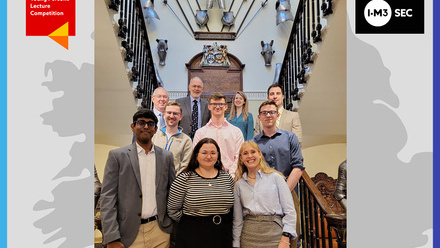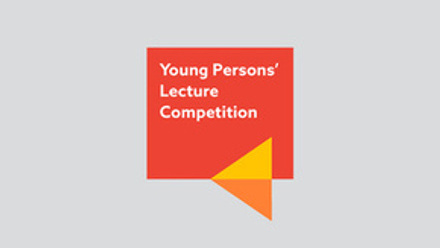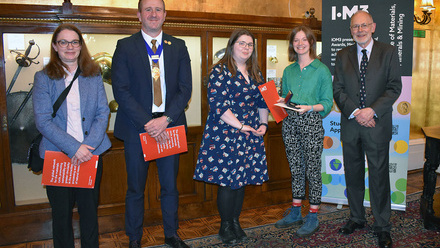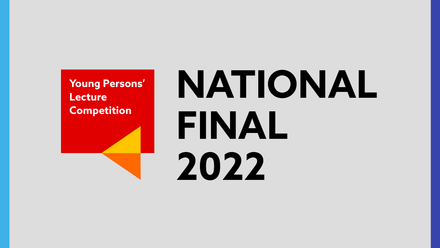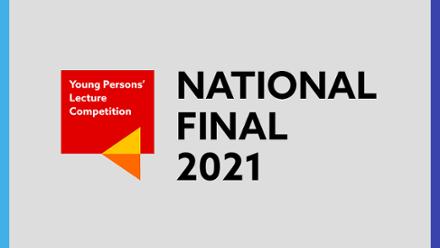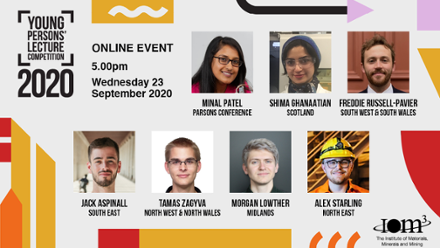Organised by IOM3, sponsored by The Worshipful Company of Armourers & Brasiers, Henry Royce Institute, Lucideon and East Midlands Materials Society (EMMS), the Young Persons' Lecture Competition invites students and and early career professionals (from 18 up to the age of 28) to deliver a short lecture (12 to 15 mins) on a materials, minerals, mining, packaging, clay technology, wood science or engineering related subject.
2025 Young Persons' Lecture Competition UK finalists
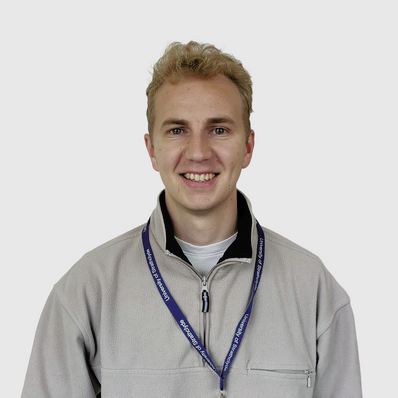
Scotland
Hamish Dow

Scotland
Hamish Dow
Dr Hamish Dow is a Research Associate at the University of Strathclyde’s Department of Civil and Environmental Engineering. His research investigates novel AI-based imaging methods for detecting and quantifying concrete structure defects. Hamish's lecture will explain how AI can be used for visual inspections, highlight innovative concrete inspection methods developed at the University of Strathclyde, and present real-world, Strathclyde-led, case studies demonstrating AI-driven inspection applications.
Lights, camera, action: Automated visual inspections of concrete structures
Early identification of defects in concrete structures is vital to ensuring their longevity and resilience. However, traditional visual inspections are expensive, inconsistent, labour-intensive, and dangerous.
Our invention, Adaptive Lighting for the Inspection of Concrete Structures (ALICS), is a new inspection platform: it is an automated, and robot-mountable concrete visual inspection device that uses lighting and artificial intelligence to detect, classify, quantify, and monitor concrete defects with unprecedented speed, accuracy, and precision.
ALICS’s lighting-enhanced inspection method enables fast, targeted concrete defect repair and monitoring of concrete infrastructure, extending asset lifespans and reducing carbon-intensive new-build construction.
This presentation will showcase ALICS’s lighting-enhanced inspection method and concrete defect detection abilities. Results from on-site deployment will also be presented, validating ALICS’s methods in a real-world environment.
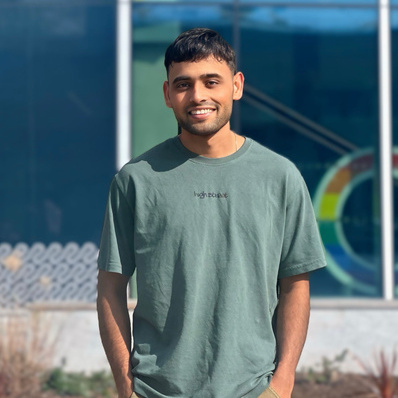
North West & North Wales
Sethupathi Rangaraj

North West & North Wales
Sethupathi Rangaraj
Sethupathi is a second-year PhD student and a Dean’s Doctoral Scholar in Materials Science (Imaging and Characterization) at the University of Manchester. His research focuses on understanding the failure mechanisms of additively manufactured alloys (AlSi10Mg) using advanced characterization techniques such as 3D Electron Backscatter Diffraction (EBSD) and X-ray Computed Tomography (X-ray CT). He is also driving his research toward real-world impact by collaborating with industries to maximize the value of his PhD.
Apart from research, he is passionate about science communication and outreach. As a Discover Materials Ambassador, he engages with young students through inspiring workshops and hands-on experiments to promote awareness and excitement about materials science. In his free time, he enjoys archery, bouldering, and cooking.
Why can additively manufactured materials fail differently in different directions? Investigating the role of defects
Additive manufacturing (AM) offers enhanced control over material properties and design flexibility, with Laser Powder Bed Fusion (LPBF) enabling the creation of alloys with finely tuned characteristics and minimal material waste. This approach is more sustainable than traditional manufacturing, reducing material consumption and emissions. However, LPBF is prone to defects like lack of fusion and porosity, which can negatively impact mechanical performance. These defects vary in orientation, affecting material behaviour.
Understanding how defect orientation affects mechanical properties is key to improving AM reliability. X-ray CT (Computed Tomography) offers detailed insights into the structure and distribution of defects. This study investigates how defect orientation in LPBF alloys influences mechanical failure, using X-ray CT to assess defect impact. The findings aim to optimize parameters, enhance material quality, and contribute to more reliable and sustainable AM technologies.
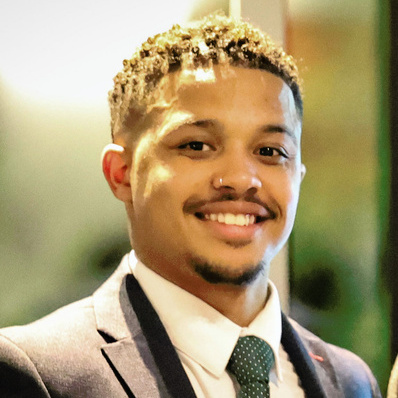
South West & South Wales
Samual Ngombe

South West & South Wales
Samual Ngombe
Samual is a third-year EngD student at Swansea University, working on scaling up the commercial potential of next-generation perovskite solar cells. His presentation focuses on a game-changing solar technology developed by Power Roll, exploring how it works, why it matters and the powerful role solar energy can play in addressing our global energy challenges. With the world striving to meet Net Zero goals, Samual is determined to contribute to real-world solutions.
Aside from his research (which often means spending quality time in a cleanroom suit and hair net), Samual has done his fair share of American Football (both playing and coaching). He is a huge advocate for sustainable living and believe that access to clean energy should be universal, no matter the circumstances. Hopefully, he can not only share some insights but also alter your perspective on solar energy, showing how something as small as micro groove can have a big effect on the global democratisation of energy.
From grooves to grid: The next generation of solar technology
Power Roll has pioneered a fully R2R production process based on their novel architecture. This involves embossing microgrooves onto a flexible substrate, followed by directional deposition of electrodes and charge transport layers on opposite faces of each groove. R2R perovskite deposition and encapsulation finish the PV modules in a highly scalable low-cost manufacturing process.
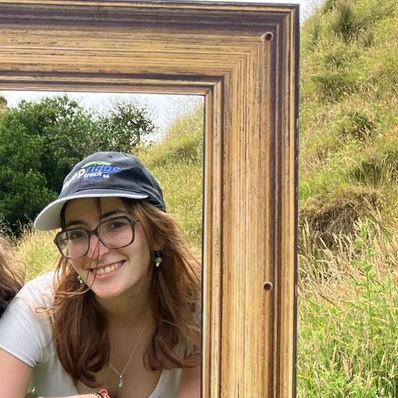
Midlands
Amelia Tortell Milhano

Midlands
Amelia Tortell Milhano
Amelia is a Materials Scientist at 4D Medicine Ltd., a startup based at MediCity in Nottingham, where she has worked since graduating with an MEng from the University of Oxford. Her role involves preparing and characterising degradable polymer systems, and 3D printing these materials into a range of commercial medical devices. Amelia grew up in Switzerland and is a dual citizen of Portugal and New Zealand but has found her home in the East Midlands.
Delving into the 4th dimension: 3D printing resorbable polymers for regenerative medicine
In recent years, advancements in additive manufacturing (AM) have unearthed 3D printing as a manufacturing process in its own right. Its inherent design freedom allows for the creation of customisable, complex, small-scale geometries. Innovation in materials chemistry has led to the synthesis of new bioresorbable polymers. The advantages of resorbable medical materials are vast, and their development promises endless novel device concepts.
AM has long been used to produce inorganic medical devices. However, it is not until recently that successful 3D printing of organic, biodegradable materials for medical devices has been accomplished. At 4D Medicine, Digital Light Processing, is used to 3D print a range of devices from a biodegradable resin with tuneable mechanical properties.
In this talk, I will explore the motivation behind combining these two emerging technologies, the materials challenges unearthed in doing so, and the opportunities that this creates for the healthcare industry.
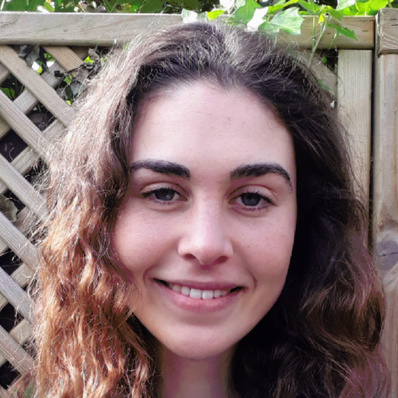
South East
Emma Bryan

South East
Emma Bryan
Emma is a PhD student in the Materials department at Imperial College London, researching molecular semiconductors. These materials are enabling advances in the field of organic electronics, from more flexible, lightweight and wearable devices to brighter, more energy efficient displays and solar cells. Her PhD focuses on the characterisation of these next-generation materials, understanding their structure and conductive properties, particularly using scanning probe methods which is the subject of her presentation!
Outside her PhD Emma enjoys creative writing, painting and music. She believes there’s a big overlap between art and science, so loves anything that explores this space. She also enjoys designing outreach activities and volunteering to help inspire the next generation of scientists and engineers.
An ode to conductive probes
Atomic Force Microscopy (AFM) is a fantastic technique for characterising nanoscale properties. AFMs are like a miniature record players: an ultra-sharp ‘tip’ scans over a sample, generating a 3D map of the nano-bumps and grooves. The resolution is so good that, if you’re super careful, you can image individual chemical bonds. AFM is non-destructive and requires no special preparation, which is particularly useful for soft materials that degrade in electron beams. Advanced AFM modes can unlock new nanoscale functional information about materials, which is the basis of my research.
By applying a voltage through a conductive AFM probe, we can excite vibrations in piezoelectric materials which can be measured using the highly sensitive detector. I use piezoresponse force microscopy to create nanoscale patterns in polymers, which are useful in next-generation data storage, and can be used to locally reorient molecular layers. This opens the door to tailored flexible electronic devices.
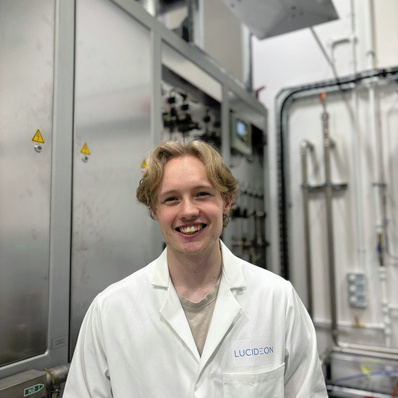
North East
Ethan Ellis

North East
Ethan Ellis
Ethan Ellis is a second-year materials science degree apprentice at Lucideon with the University of Derby. His work involves projects centered around materials development in aerospace and defence applications on advanced ceramics. One self-led project that Ethan is developing is a new ultra-high temperature ceramics processing method. However, Ethan's interest in weird and wonderful materials has inspired him to give this lecture on Synthetic spider silk.
Synthetic spider silk: A sustainable future for high-performance materials
Spider silk, renowned for its strength-to-weight ratio surpassing steel, has been challenging to mass-produce because of its complexity. The material's unique structure allows for simultaneous toughness and ductility, setting it apart from traditional materials. Recent discoveries in the production of this material, through genetic engineering of microbes and silkworms, allow for its implementation into real-world applications. This literature review explored the mechanisms, processing, and future applications of synthetic spider silk. The findings show synthetic spider silk demonstrates exceptional mechanical properties of 35-50% elongation and 5GPa tensile strength while remaining biodegradable and biocompatible. Sustainable production methods such as synthesizing proteins at body temperature. These developments position synthetic spider silk as a promising biomaterial with potential applications in medical technology, advanced textiles, and high-performance engineering solutions.
Sponsored by
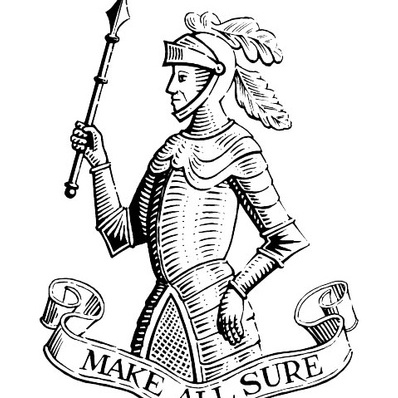

The Worshipful Company of Armourers & Brasiers
The Armourers & Brasiers’ Company is one of the largest private sponsors of education and research in Materials Science in the UK. It is a livery company of the City of London, tracing its origins back to 1322. The Company’s home, Armourers’ Hall, has occupied the same site since 1346. The Armourers & Brasiers were engaged in the control and development of the armour and brass trades in London from medieval times until the industrial revolution, ensuring quality control, supporting the training of apprentices and encouraging manufacturing innovation. From its beginnings the Company engaged in philanthropy. In earlier centuries this was largely for the welfare of its members and their dependents but since Victorian times it has increasingly targeted its charitable giving towards science education and research, with a particular focus on Materials Science. Currently it gives over £220,000 each year for this purpose, mainly in small grants to numerous beneficiaries ranging from primary schools through to universities. In July 2020 the Company through its charitable arm the Gauntlet Trust, gave its largest ever gift to established the Armourers & Brasiers Chair in Materials Science at Imperial College to mark its 700th Anniversary in 2022.
- Website:
- www.armourershall.co.uk/
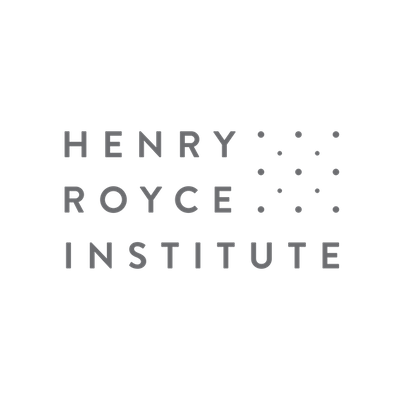

Henry Royce Institute
The Henry Royce Institute is proud to partner with IOM3 in supporting the Young Person’s Lecture Competition. Royce shares with IOM3 a passion not only for developing the next generation of materials, but also the next generation of materials scientists. A number of former winners of this competition have engaged with Royce during the course of their research and we are encouraged to see the exciting research undertaken presented by the people who have undertaken the research.
The Henry Royce Institute is the UK’s national institute for advanced materials research and innovation. Royce was established to ensure the UK can exploit its world-leading expertise in advanced materials and accelerate innovation from discovery to application. With investment of over £300 million, and ongoing long-term support from the Engineering and Physical Sciences Research Council, Royce is ensuring that both the UK academic and industrial materials community have access to world-class research capabilities, infrastructure, expertise, and skills development.
From future cities and their energy supplies, to computing, manufacturing and medicine, the research and innovation facilitated by Royce has the potential to significantly impact peoples’ lives. With its Hub in Manchester and with capability distributed across nine founding Partners, Royce works collaboratively to create real solutions and make a fundamental difference to the UK economy.
Through a variety of access grants, Royce offers students, academics, and industry world-class equipment, expertise and training, to support their advanced materials research.
- Website:
- www.royce.ac.uk
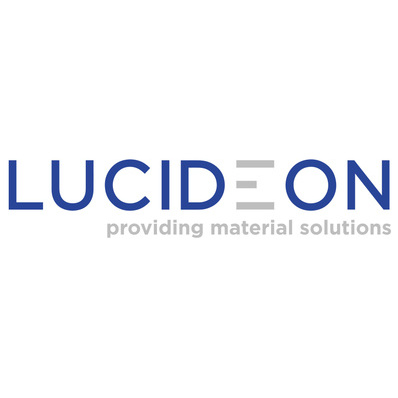

Lucideon
As a development and commercialisation organisation, Lucideon specialises in the research, implementation, and scaling-up of novel materials technologies. We work across a variety of industries including healthcare, construction, energy, and aerospace, with expertise in a wide range of materials. Lucideon utilises its thousands of combined years of experience in development, analysis, and assurance to provide technical consultancy to enhance and accelerate its clients' R&D activities.
Lucideon hosts and manages The AMRICC Centre, an open-access international facility partly funded by UKRI through the Strength In Places Fund, which focuses on transforming innovative materials and technologies into real-world solutions.
- Website:
- www.lucideon.com/


East Midlands Materials Society | EMMS
East Midlands Materials Society is proud to continue to support the UK final of the Young Person’s Lecture Competition. We have run a local heat for well over fifteen years now, and our winners have had some success in the finals.
EMMS is a Local Society affiliated to IOM3 which has technical meetings in Derby, Leicester, Lincoln, Loughborough and Nottingham and has been in existence since 1950. We have also run successful conferences with the next one taking place on 3rd June 2025, at Rolls-Royce Derby Learning Development Centre, entitled “Tribology 2025 – Materials Making the Difference”. The conference is being jointly organised with the Thermal Spraying and Surface Engineering Association and supported by the IOM3 Surface Technologies Group.
We are fortunate to receive support from Rolls-Royce and the Universities of Derby, Leicester, Lincoln, Loughborough Nottingham and Nottingham Trent. Our attendees include people from local industry, research institutes, colleges and the universities. We do much to support our local students, sponsoring many of them to become members of IOM3. We also refund travel expenses for students travelling to meetings and give financial support for students to attend and present papers at conferences. We also support local schools, co-sponsoring local IOM3 school events.
We have met the challenge of running virtual events. As part of our annual programme, we now include virtual only talks in the winter months and, for talks we hold physically, these are live streamed as well. Holding meetings virtually has allowed participation of those that find it difficult to physically attend. Virtual only meetings allow us to have international speakers. Last season we had a talk on carbon capture materials from a Professor at the North Carolina State University.
Most of our committee members have full-time careers, so we run the society with a minimum number of virtual committee meetings, doing most of our business by electronic communication. We are a lean, well run Local Society, making a significant contribution to the region.
We are also delighted that we have been awarded the IOM3 Local Society of the Year 2024.
Dave Evetts
Honorary Secretary, East Midlands Materials Society
- Website:
- bit.ly/IOM3_EMMS
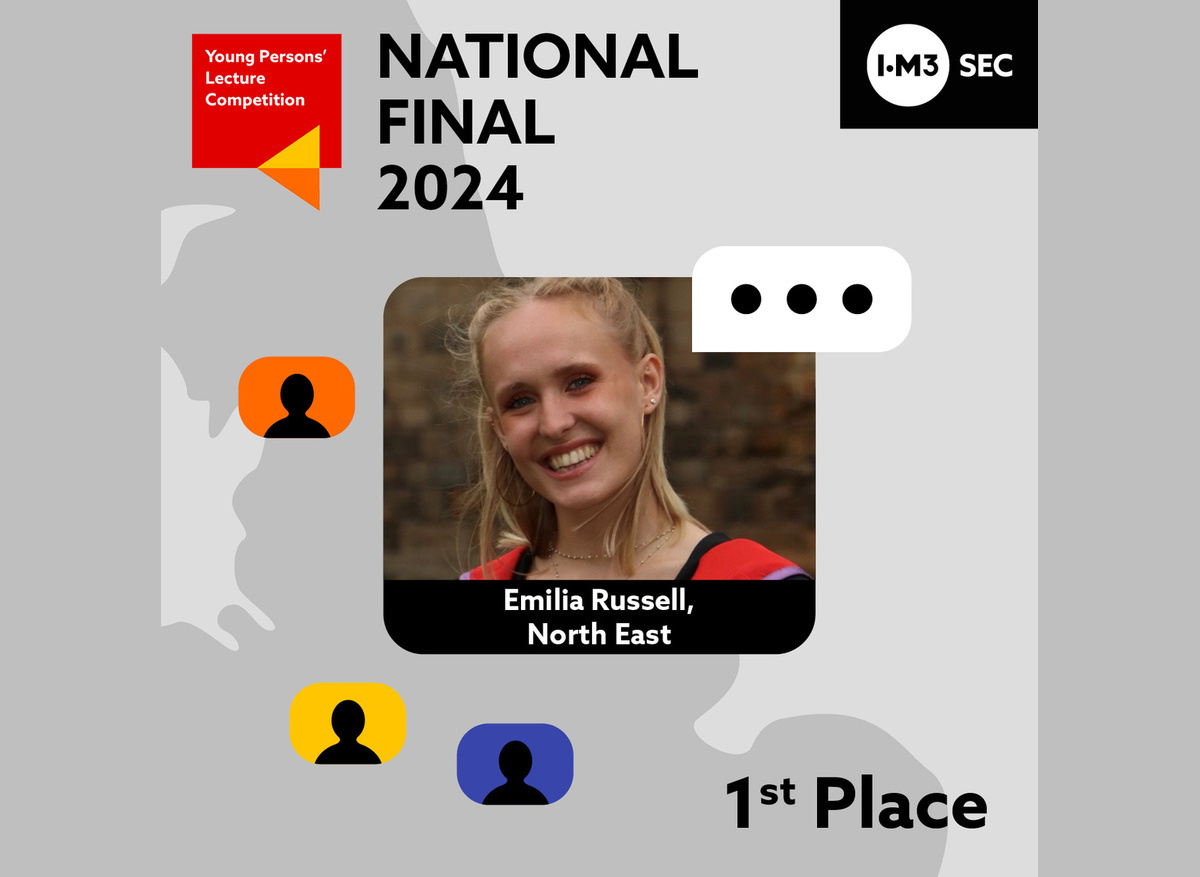
Emilia Russell
'The 2024 YPLC was such an incredible experience! Getting to meet some amazing PhD students and learn about their research, and having the opportunity to talk about my own in such a beautiful venue feels like a dream come true. I am honoured to have been awarded first place and I am really looking forward to being able to communicate my research on an even larger scale in the future.'
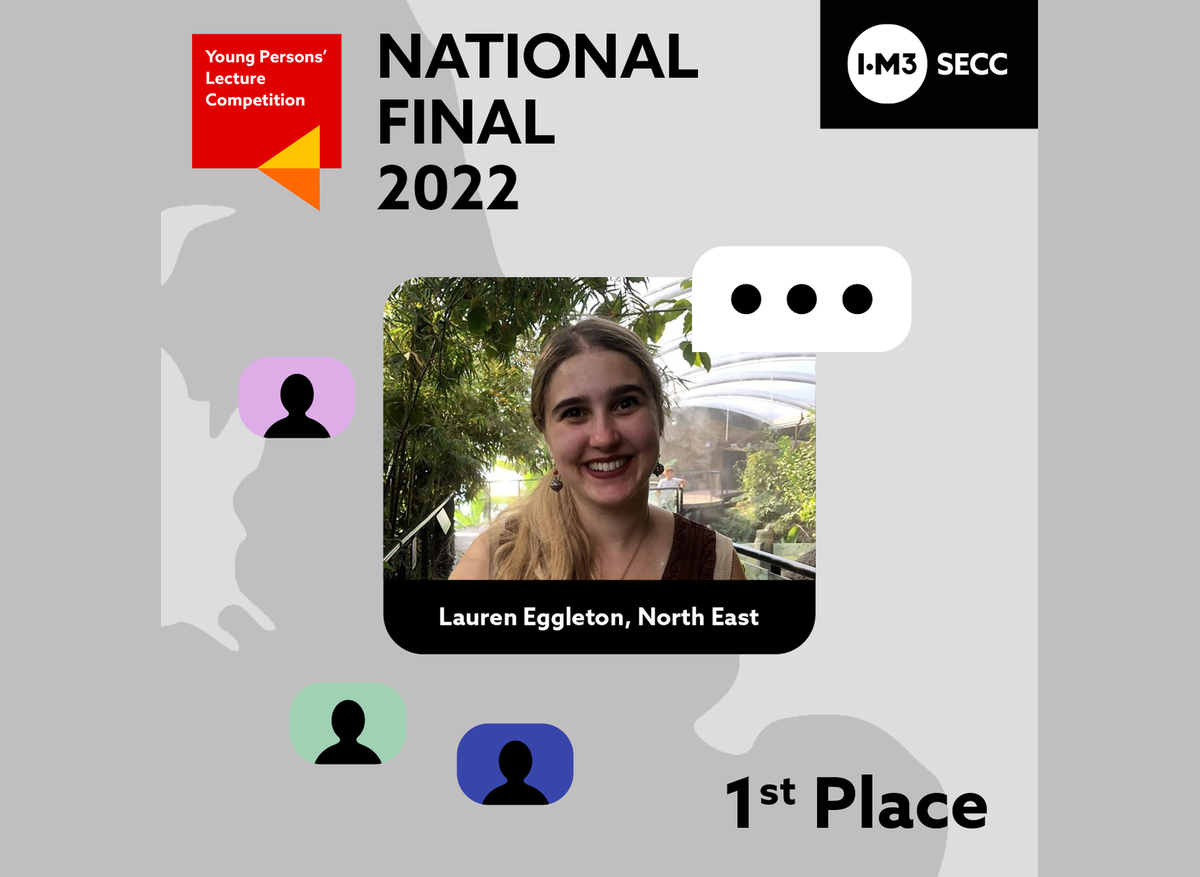
Lauren Eggleton
'I just feel honoured the judges felt mine was worthy of winning compared to everybody else as the standard was so high!'
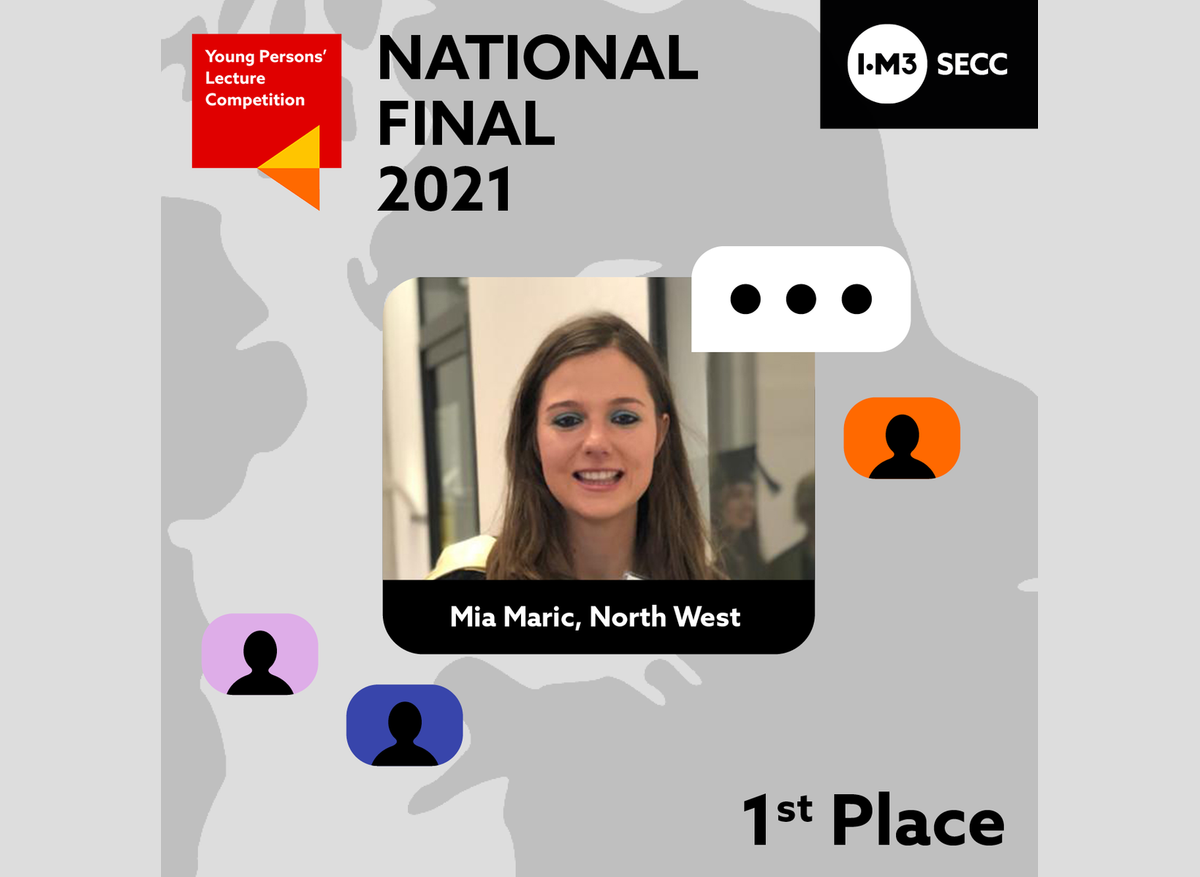
Mia Maric
'Participating in the UK final was a really great experience, all of the talks were so unique and interesting. I am really excited to compete at the YPWLC not only to meet and collaborate with other young scientists, but also learn about the diversity of research happening globally within the field of materials.'


